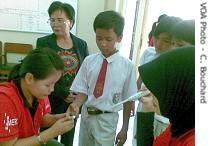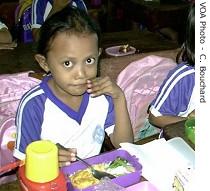2007年VOA标准英语-Indonesia Combats Widespread Childhood Anemia(在线收听)
Jakarta
11 June 2007
An Indonesian public health foundation is waging an anti-anemia campaign in Jakarta, where some schools have reported more than half their students are anemic. As Chad Bouchard reports from Jakarta, medicine and nutritional education is making a small dent in this global epidemic.
Health officials estimate that two billion people, nearly a third of the world's population, suffer from anemia.
Anemia is a major factor in maternal and infant deaths during childbirth, and the World Health Organization estimates that more than half of the pregnant women in developing countries are anemic.
Africa and Asia are hit hardest by anemia. Indonesia is one country that has been struggling to come to grips with the problem.
 |
| Staff members with Indonesia's Kusuma Buana Foundation test hemoglobin levels of Jakarta schoolchildren |
Anemia delays development and hampers children's chances of succeeding at higher levels of education. Families are often unaware that their kids are anemic.
At the at the Kebon Manggis Matraman School in east Jakarta, students reluctantly line up for a pin-prick blood test.
A foundation working together with the German pharmaceutical company Merck is monitoring the iron levels of more than 50,000 Jakarta elementary students, and providing supplements to those who need them.
Doctor Pudji Rahardjo, coordinator for one of the Kusuma Buana foundation's clinics, describes the testing.
"We mix the blood sample with a reagent here, and then we check the blood level. And then you can get the result," the doctor explained.
Rahardjo says the shortage of hemoglobin makes sufferers feel lethargic and leaves them vulnerable to life-threatening infections and other disorders.
She says before the treatment, the anemic students had very short attention spans and would often fall asleep in class.
"Anemic child looks pale, the skin is pale, and they don't have the spirit of the rest of the children. Usually they get lower grades than their friends. That is the symptoms of anemia," she said.
Three months ago, half of the 162 students at the school tested positive for anemia.
Since then, the students have received iron and B-vitamin supplements two times a week.
Now, all but 11 of the students are back to normal health.
Nurianti, one of the school's teachers, says she noticed a change after the students were given just two doses of the supplements.
Nurianti says the students have more enthusiasm for learning, becoming more clever and more active.
She says their ability to perform language activities increases immediately, and their mathematics scores slowly catch up.
The director of health care at the foundation, Adi Sasongko, says the key to getting nutritional anemia under control is education.
Sasongko says the challenges are slightly different depending on the location.
 |
| Jakarta elementary school student sits down to an iron and vitamin-rich meal as part of a weekly nutrition education program |
Sasongko says in Indonesia, sources of iron such as fish and green vegetables are widely available. But children do not like them and their parents do not push the children because they are not aware of what is at stake.
In the Seribu islands off the coast of Jakarta, Sasongko says, people eat plenty of fish and vegetables. But poor hygiene leaves them vulnerable to parasites like hookworm, which cause anemia by leaching nutrients from the body.
In both cases, good health education can prevent the disorder before it takes hold, reducing or eliminating the need for supplements or expensive treatments.
Officials with the World Health Organization say when anemia is left untreated in children or adults, it depresses the immune system and can result in life-threatening infections.
Doctor Neelam Dhingra is the coordinator for blood transfusion safety with the WHO in Geneva. She says anemia testing is a critical way to head off serious conditions before patients become so ill that they need a transfusion.
"It's difficult to say whether it can be wiped out entirely or not, but it can be subsequently reduced with the wide-scale education of people - you know, improving dietary habits, And anemia, as I've said, is not a disease, it's a symptom, but the symptoms are very vague," the doctor said. "So you know a person who is feeling very tired and feeling lethargic and looks pale has to be diagnosed as anemia, and anemia is highly prevalent so, you know, it is very important that it is timely diagnosed and treated."
Activists in Jakarta admit the anti-anemia campaign here is small, reaching just 200 of the more than 3,000 elementary schools in the city. But the campaigners are hoping the program will expand, and become a model for other health organizations.